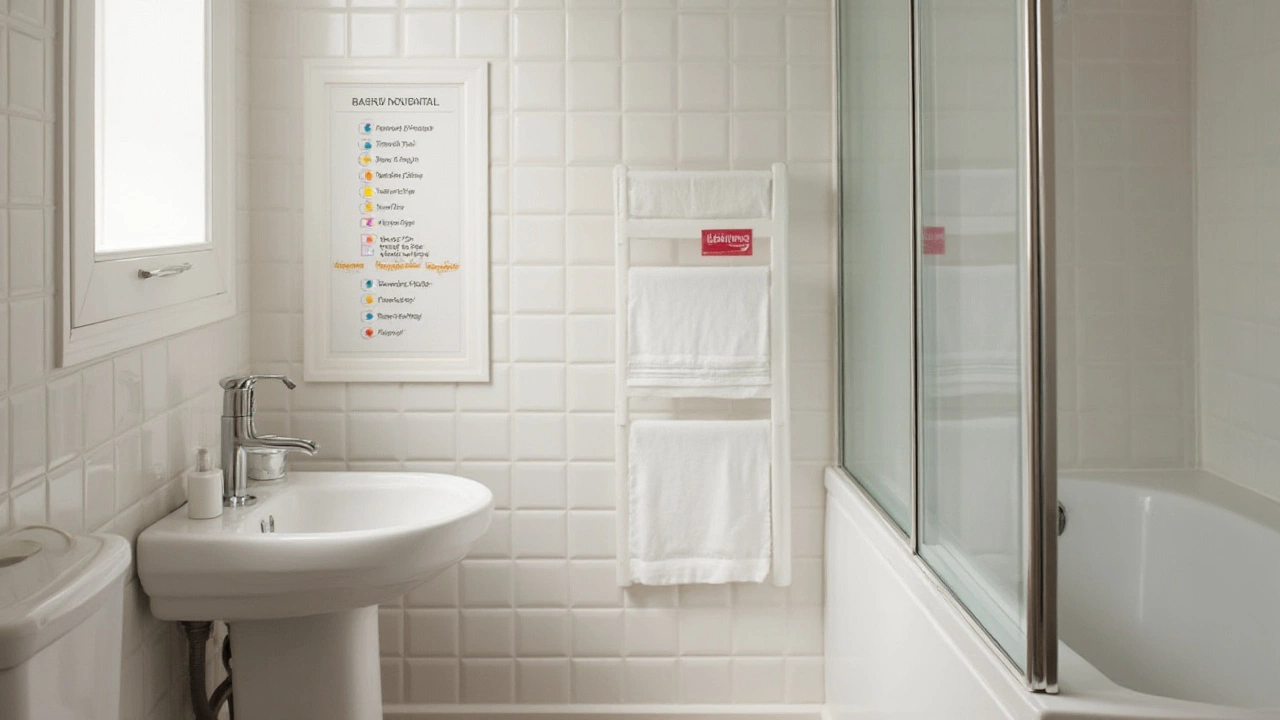Mastering the Art of Shared House Living: Tips and Insights
 Dec, 15 2024
Dec, 15 2024
Living in a shared house is an adventure that blends the joys and complexities of community living. It's an arrangement that brings together people with diverse backgrounds and habits, which can be both rewarding and challenging. Understanding how to navigate this shared space is key to building a harmonious home environment.
Whether you're new to the idea or have shared a house before, it’s crucial to approach this lifestyle with a mix of empathy, patience, and open-mindedness. By setting clear boundaries, sharing responsibilities fairly, respecting personal space, and maintaining open lines of communication, living in a shared house can turn from a daunting experience into a fulfilling one.
This article will explore these essential aspects of shared living, providing you with practical advice and strategies to ensure your cohabitation journey is smooth and enjoyable.
- Setting Boundaries and Ground Rules
- Sharing Responsibilities and Costs
- Respecting Personal Space and Privacy
- Conflict Management and Communication
Setting Boundaries and Ground Rules
Living in a shared house requires more than just dividing the rent and deciding who gets the bigger room. It involves setting clear boundaries and ground rules to ensure that everyone thrives in the shared living situation. When multiple personalities merge under one roof, defining these guidelines becomes a cornerstone for harmonious coexistence. Recognizing and respecting the personal space and preferences of each housemate is just the beginning. It’s pivotal to set house rules early on to keep misunderstandings at bay. From deciding on quiet hours to understanding cleaning schedules, these rules help mediate daily life challenges that arise naturally in any shared space.
To create effective boundaries, communication is key. Start with a house meeting to discuss everyone's needs and preferences openly. This is a time for honesty and understanding. Everyone should feel comfortable voicing their concerns and suggestions. It’s not just about finding compromises but also about respecting individual needs. For example, some people might work late hours and require quiet mornings, while others might prefer social gatherings during weekends. Accommodating different routines can be challenging, but it's crucial for maintaining peace and productivity in a shared living environment.
Think about crafting a living agreement that outlines shared expenses, cleaning duties, and even guest policies. This written agreement acts as a reference point that everyone can revisit, especially when disputes arise. Having it in writing prevents future conflicts by setting clear expectations from the start. Remind housemates to approach these discussions with an open mind and a willingness to adapt. It's about being flexible yet firm in one’s boundaries. An open discussion can set the tone for a respectful and cooperative household.
“Good fences make good neighbors,” as the saying goes, captures the essence of setting boundaries in shared spaces perfectly. It emphasizes the importance of respecting each other's limits while living in close quarters.When expectations are clearly laid out, it removes gray areas and reduces friction among housemates. Regular check-ins can also help address any changes in needs or circumstances, allowing for adjustments in the house rules when necessary.
For a visual reminder that aids in maintaining order, try placing a chore chart or calendar in a common area. This not only helps keep everyone accountable but also visually represents each person’s contributions toward maintaining the space. Transparency is essential in ensuring everyone feels valued and that their efforts are recognized. Emphasizing these house sharing principles helps unite the housemates, encouraging a positive living environment. Practicing respect and maintaining open dialogue ensures that each resident can enjoy their home, a place of relaxation amidst shared responsibilities.

Sharing Responsibilities and Costs
When it comes to shared living, dividing up tasks and expenses requires thoughtful planning and clear communication. The beauty of house sharing lies in the opportunity to distribute the load evenly among housemates, making life not only more affordable but also less burdensome for everyone involved. Key to achieving this balance is holding a meeting with all residents to discuss roles and financial obligations, which ensures that everyone is on the same page and contributes fairly.
Begin with household chores, which often are a bone of contention if not managed properly. A practical approach is to create a rotating weekly roster that outlines who is responsible for specific tasks like cleaning, trash duty, and grocery shopping. This system not only guarantees that tasks are completed regularly but also fosters a sense of accountability. A digital tool or shared app can facilitate this process, allowing housemates to track duties and remind each other gently and effectively. A fascinating statistic from a survey conducted by Rent.com revealed that houses with structured chore systems reported a 45% reduction in household conflicts.
Financial responsibility can be more complex, yet equally crucial. Evidently, splitting bills and rent proportions fairly depends on room sizes or individual usage of utilities such as water, electricity, and internet. Discussing and agreeing on these details at the outset will help avoid misunderstandings later. An excellent method is to use a shared spreadsheet or an app dedicated to tracking shared expenses, ensuring everyone is aware of their contributions and payments.
"Clear financial arrangements from the start can pave the way for a smooth cohabitation experience," advises John Reynolds, a renowned expert in communal living and cohabitation dynamics.
Managing communal goods expenses, like toilet paper, cleaning supplies, and condiments, can be handled seamlessly through a shared fund or kitty where each person contributes a set amount monthly. This fund can be managed by one person or rotated among housemates to ensure transparency and trust. Additionally, having a household meeting at the end of each month to review expenses and make any necessary adjustments will promote openness and mitigate potential friction. Remember, financial harmony contributes significantly to a peaceful shared home environment.
Cohabitation tips like these not only enhance your shared living experience but also encourage a culture of respect and collaboration. When each housemate knows what they owe both in terms of chores and finances, everyone can enjoy their home comfortably and sustainably. Establishing these practices early on sets a solid foundation for a rewarding shared house experience.

Respecting Personal Space and Privacy
Living in a shared house environment requires a delicate balance, especially when it comes to personal space and privacy. These are vital components that can make or break the shared living experience. Personal space isn't just about physical boundaries, like having one's own room or designated workspace. It's also about the emotional and mental spaces that each sharer needs to feel comfortable and safe. Understanding and respecting these boundaries is key to fostering a positive atmosphere. Many long-term sharers find that establishing clear signals, such as a closed door meaning 'do not disturb,' helps delineate these spaces.
Privacy is both a right and a responsibility in shared living situations. It includes not just respecting closed doors but also keeping shared areas clean and organized, allowing others the freedom to have personal time without interruptions, and understanding the concept of privacy in terms of personal belongings. It is not just about physical space; it's about emotional safety too. Ensure that any sensitive or personal information gained in confidence is kept private. Setting these boundaries early on can help prevent future misunderstandings.
House sharing often requires us to develop new habits that align with the needs of our cohabitants. For example, consistent routines, like silent hours during late nights or early mornings can contribute greatly to a peaceful coexistence. Creating a household schedule for using shared amenities, such as bathrooms and kitchens, helps ensure everyone can plan effectively. Occasionally, thoughtful gestures, like using headphones for late night TV shows or music, can show consideration for others' needs for quiet.
"A strong sense of personal boundaries is the backbone of a harmonious shared living arrangement." - Mary Lambert, author of 'Good Boundaries' Guide.
Communication plays a crucial role in respecting personal space. Open discussions with your housemates about each other's needs and preferences can lead to mutual understanding. It’s helpful if everyone feels comfortable speaking out if they feel their space is being encroached upon. Addressing such matters calmly and respectfully not only helps avoid resentment but also helps to maintain a positive living environment over time.
Balancing Social Interactions
While respecting privacy, remember to maintain healthy social interactions. Living with others can be isolating if personal spaces are too rigid. Finding activities that everyone enjoys, like shared movie nights or communal dinners, can help balance privacy with the need for companionship. It’s these little efforts towards bonding that help create a homey atmosphere, fostering both individual respect and communal harmony.
Alternative statistics show that households that actively work on mutual respect report a 25%-30% greater level of satisfaction in shared living arrangements. This satisfaction stems largely from understanding and respecting each person's need for personal space while nurturing an environment of trust and camaraderie. By fostering an atmosphere of respect towards privacy, everyone can enjoy the benefits of a shared house while feeling secure, both physically and emotionally.

Conflict Management and Communication
Living in a shared house inevitably brings moments of tension and misunderstandings, given the mosaic of personalities involved. One of the primary skills to master in house sharing is conflict management, which is surprisingly less about never having conflicts and more about how you resolve them. When living together, differences in lifestyle, cleanliness standards, or noise levels can spark disagreements. It's vital to develop a proactive approach, anticipating potential sources of conflict and addressing them before they escalate. Open communication serves as the foundation for successful conflict resolution; it is important to create an environment where everyone feels comfortable discussing issues openly and honestly. Sometimes, holding periodic house meetings can facilitate this dialogue and help mend any rift before it grows larger.
Effective Communication Techniques
Effective communication is a skill that can transform shared living situations from tense to tranquil. It's recommended to approach each discussion with empathy and a willingness to listen. Acknowledging your housemate’s perspective doesn't mean you agree with it; it simply shows respect for their viewpoint. Using 'I' statements instead of 'you' can lessen the blame and make the other person less defensive. "Active listening" is another critical tool, where you pay attention to what the other person is saying without planning your response at the same time. This can help ensure that house discussions are fruitful and mutual understanding is achieved.
Problem Solving in House Sharing
In shared living, solving disputes effectively requires both creativity and compromise. Begin by identifying the root cause of the conflict instead of fixating on symptoms. Once pinpointed, brainstorm solutions that work for everyone.
"The best way to resolve conflicts is to think of a win-win solution," says Deborah Tannen, a renowned communication expert. Recognizing that it's not about one party winning and the other losing, but achieving a solution that at least partially satisfies all parties involved, can vastly improve long-term cohabitation dynamics. It's also prudent to respect each individual's boundaries and personal needs during this process, which helps ensure that everyone feels their concerns are heard and considered.
Data on Conflict Resolution Outcomes
A study conducted by the National Association of Housing showed that households implementing regular communication and conflict resolution strategies reported 40% fewer disputes over the course of a year. Interestingly, those that held monthly meetings were more likely to describe their living situation as "harmonious." This data highlights the importance of maintaining consistent communication channels to keep misunderstandings at bay. When residents realize the value of structured dialogue, it cascade into a much more cooperative and positive living atmosphere.